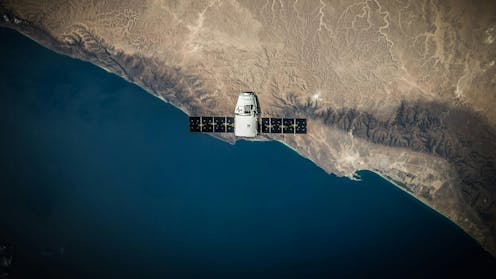Escape to space with the ultra-rich, or live frugally amid eco-disaster? Jennifer Mills imagines a divided near future
- Written by Joanne Anderton, PhD candidate, Creative Writing, The University of Queensland

Every new novel from Jennifer Mills is a fascinating puzzle, gorgeously rendered and emotionally rich. While all the pieces are there, in plain sight, from the moment you open the first page, they reveal their picture gradually, with precision and grace.
In The Airways those pieces created a haunting exploration of gender, violence and embodiment; in Dyschronia, a surreal eulogy to time, the truth and the world as we know it.
Review: Salvage – Jennifer Mills (Picador)
In Salvage, these pieces combine into a near future struggling to adjust to the consequences of a warmed world. Rising sea levels and severe weather have led to mass-migration, social instability and the renegotiation of power and economic structures.
In the midst of all of these sweeping destabilisations, people are just trying to get by. The rich search for ways to escape any real hardship, while the poor salvage what they can. Family remains family, as supportive and problematic as they have always been.
An eco-disaster orphan
Jude knows all of this intimately. As a child, she was orphaned by the Endurance eco-disaster and adopted (“rescued”) by JB Prince, head of Prince Industries, whose mines were responsible for poisoning her town (although nothing, of course, was proven). When JB died in suspicious circumstances, she was effectively raised by his surviving daughter, Jude’s older adoptive sister, Celeste.
Celeste, for all her wealth and sophistication, was fragile. She kept them both locked away in Sovereign House, her family’s estate, isolated from the protesters, the desert and the death throes of Australian society. Celeste clung to her younger sister tightly, an anchor in rough seas. When given the opportunity to escape this dying world on the Endeavour, an experimental space station for the ultra-rich, Celeste took it. Jude refused to join her.
So when the Endeavour failed, and fell burning from the sky, it took the last of Jude’s family with it.
Now she lives and works in Northport, a salvage station in the backwaters of the Freelands. She drives a truck, sometimes full of supplies, sometimes with refugees. She’s left Australia behind, tried her hand at various jobs and various relationships, but refuses to let herself be tied down by either. She carefully avoids any interaction with the authoritarian Alliance, struggles to get a good night’s sleep, and tells no one about her past.
But then an escape pod is salvaged and brought to Northport. Impossibly, its inhabitant is still alive. Despite the years and the changes both have undergone, Jude recognises her. Suddenly, she is forced to weigh up the life of isolation and anonymity she has built for herself with responsibility for a family she thought long gone.
The cost of freedom is isolation
Salvage opens as Jude attempts to leave Northport, alone, in the pre-dawn dark, because “Celeste is her problem: the risk should be hers alone”. We don’t, at this point, have any idea who Celeste is, what she means to Jude and why she might be a problem. But none of that matters. The important part here is Jude is determined to do this difficult thing all on her own, but a small selection of friends refuse to let her.
Jude tries so hard to avoid any real connection with other people, but despite her attempts at isolation, she’s managed to create a little found family in Northport. Most definitely against her better judgement.
This is not the first time Jude’s up and left a place that might, if she’s not careful, become something of a home. She has experience in this area. The book begins with the heart-wrenching line: “Everything you carry bears the weight of what you’re leaving.” Jude travels light. She knows if she carried all the homes and the families, the friends and lovers, or even the passing acquaintances she has been forced to leave behind, she’d be so overburdened she wouldn’t be able to move. She wouldn’t be free.
And freedom is everything to Jude.
As Salvage unfolds, we follow three woven threads, three timelines, that reveal how we got here – why Jude is the way she is, what Celeste means to her, and the weight of her decision to risk everything for her long-abandoned, long-lost sister.
Present timeline Jude helps refugees create a new life in the Freelands. Living in the Freelands means sacrificing comfort, technology and decent health care. But it also allows you to escape surveillance, make your own choices and live your own way. Past Jude finds herself rebelling against the life JB so generously “gave” her, contained as it is within the boundaries of Sovereign House, and from the demands of her sister’s overbearing love.
For her part, Celeste searches for a way to leave the world behind. While it ultimately leads her to Endeavour’s hallucinogenic orbit, this longing has plagued her entire life. If she could have willed herself to disappear much earlier, and if she hadn’t had Jude to care for, she would have.
All three threads ask: what are we willing to sacrifice for freedom? Is it worth the price?
A too-close near future
And on that note, what about our responsibilities? It’s all well and good to run away, but what do we owe the people we leave behind? Our family, society. The planet itself.



















